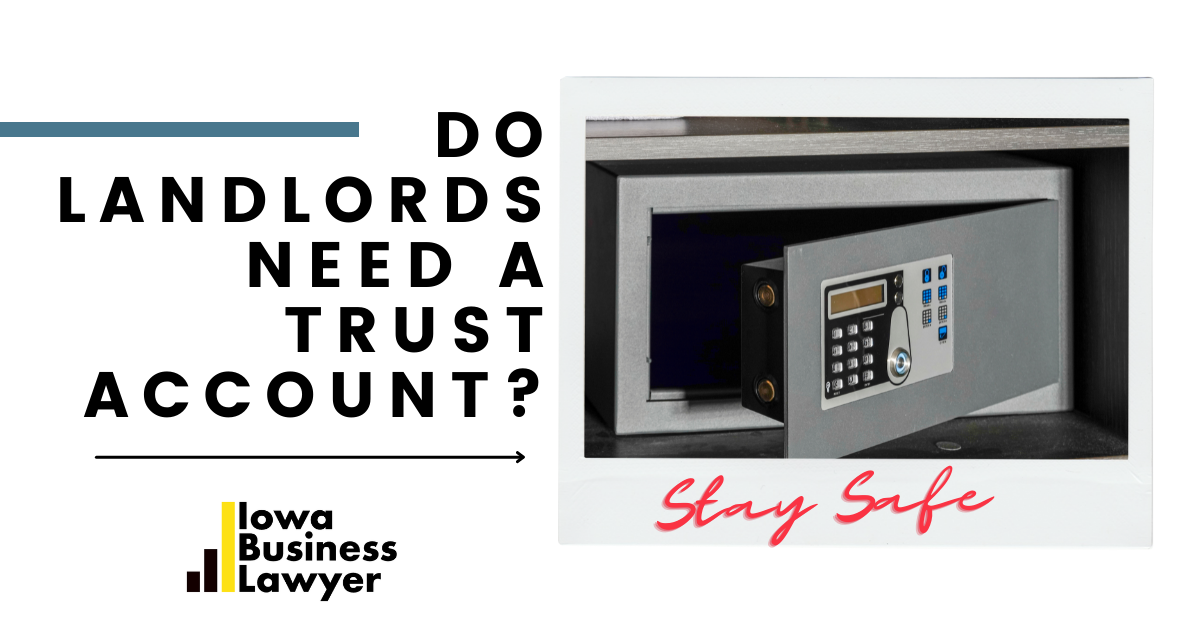Do Iowa landlords need a trust account for rental deposits?
There is legal terminology running around that says “landlords must hold rental deposits in trust,” or similar. This is not exactly what the law says, though at a high level, I believe that’s what the law means. However, it leads to confusion over what a landlord must do with rental deposits.
In short, no, a landlord does not need a special kind of bank account called a trust account, but yes, landlords do need to be able to show in their accounting tools that they are holding the deposit in a separate, special place where it is safe. Let me explain what this means.
Please note that some professionals, such as real estate brokers, may be held to a higher standard than Iowa law. This article does not address these types of relationships.
Deposits in brief
It is very common for a landlord to receive a damage deposit or some other kind of deposit when renting a home. A common amount is equivalent to one month’s rent. So if the rent is $1,200 per month, the tenant will have to make an initial payment of $1,200 for rent and an additional payment of $1,200 for the landlord to hold, as a deposit. If the tenant damages the property or stops paying rent, the landlord can apply all or part of the deposit towards the loss. If there is no damage to the property, the landlord must return the deposit within 30 days. This is all spelled out in Iowa Code 562A.12.
Trust Accounts
A trust account is a little less clearly defined. In general, it is a relationship where one party holds something valuable, like money, safely for another. The holding party has a special duty because of this relationship—to keep the property safe and secure and to not use it for their own gain. Many banks have special departments for handling trust accounts, and sometimes these trusts can be many millions of dollars.
You can open a special kind of bank account called a trust account. While you are the one who opened the account, it would be in the name or on behalf of someone else. For example, Iowa Lawyers are required to have a trust account which is held in the name of the Iowa Supreme Court. When clients pay me money, it goes into the trust account until I’ve earned it. Then it gets released to me so that I can transfer it into my own checking account.
What must Landlords do?
Iowa law 562A.12(2) says:
All rental deposits shall be held by the landlord for the tenant, who is a party to the agreement, in a bank or savings and loan association or credit union which is insured by an agency of the federal government. Rental deposits shall not be commingled with the personal funds of the landlord. Notwithstanding the provisions of chapter 543B, all rental deposits may be held in a trust account, which may be a common trust account and which may be an interest-bearing account. Any interest earned on a rental deposit during the first five years of a tenancy shall be the property of the landlord.
This law is made more clear by a court case where a landlord was sued for mishandling rental deposits. This court case heard by the Iowa Court of Appeals, gave really refreshingly simple advice on how to be compliant with the law. The court said,
The two main requirements of this section are that the landlord hold the deposits in a federally insured financial institution and that he or she not commingle rental deposits with personal funds. In order to prove the rental deposits have not been commingled, a landlord must keep records that account for each deposit and periodically reconcile the account to assure the account contains sufficient funds to cover the deposits of all renters.
Baculis v. McDougall, 460 NW 2d 186, 188 (Iowa Ct.App.1990)
To put it simply:
- Keep the money in a federally insured bank account (most bank accounts are FDIC insured, most investment accounts are not)
- Add a record in your accounting tool showing that the money was received and is credited towards the client
- Regularly check that your accounting records are accurate
You may want to talk to an accountant or book keeper, but in general, most accounting tools have the concept of “accounts,” which is a way to divide one bank account into multiple separate accounts. You have a default account, “cash,” which is money on hand that you can use for whatever, and you may have any number of other accounts which serve a special purpose.
If you receive a deposit of $1,200 you would put it into your bank account, then create an account for “XYZ Deposit” and assign that $1,200 to this new account. Your accounting tool will then show a zero change in the balance on “cash” because it received $1,200 and then transferred it out to “XYZ Deposit.”
This can be confusing because if you look at your bank statement, it will show the $1,200 as available to spend, but your accounting tool will say it isn’t there. That’s because it’s being held separately, which means it is not co-mingled with your other money.
Doing this meets the requirements of the law without opening a special account.
The main takeaway is that you cannot mix it in with your other money without using some accounting practice to ensure it is accounted for separately. You are not supposed to spend it.
If you have any questions, you should schedule an appointment with me or another Iowa attorney for help.


